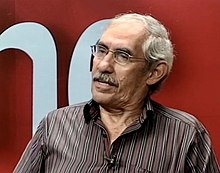Moisés Hassan
Moisés Hassan | |
|---|---|
 Hassan in 2016 | |
| Born | May 4, 1942 Managua, Nicaragua |
| Alma mater | National Autonomous University of Nicaragua North Carolina State University |
Moisés Hassan Morales (born May 4, 1942)[1] is a Nicaraguan politician. He was one of five members of the Junta of National Reconstruction that ruled the country from 1979 to 1984, following the fall of the Somozas regime.[2]
Early life
[edit]Born in Managua on May 4, 1942, to Nicaraguan mother and Palestinian father from Gaza,[2][1] Hassan studied engineering at the National Autonomous University of Nicaragua (UNAN).[3] In 1968 he earned a PhD in physics from North Carolina State University in Raleigh, North Carolina.[4]
Career and militancy
[edit]Hassan was a long-time dissident and early FSLN member. He attended his first protest against the Somoza dictatorship in 1958 and was jailed several times for his continued dissidence.[5] He joined the FSLN in its infancy in the 1960s and was a key figure in the organization by the time the uprising came to a head in the late '70s, having built a network of subversives in Managua’s slums.[5]
He was the dean of the UNAN's College of Science and Letters until he joined the anti-Somozas effort in 1978.[2] He was head of the activist National Association of Professors and became its delegate to the United People's Movement, a coalition of civic groups supporting the Sandinistas, which he founded in 1978.[2][5]
He led the September 1978 uprising against the regime.[5]
In 1979, he joined the five-member Junta of National Reconstruction (RN), alongside fellow Sandinistas, intellectual Sergio Ramírez and commander Daniel Ortega, as well as Violeta Chamorro, widow of La Prensa publisher Pedro Joaquín Chamorro Cardenal; and prominent businessman Alfonso Robelo. Hassan left the RN in March 1981.[1]
Hassan served as Minister of Construction until he became Vice-Minister of the Interior in May 1983.[1] From 1984 to 1988, he was Mayor of Managua.[4] His technical skills made him valuable in that capacity, dealing with persistent flooding in the capital.[5]
Hassan split with the FSLN in 1988.[6] He was removed from his post as Mayor for failure to follow orders from the nine-member FSLN National Directorate, at times at odds with ideological hardline members Tomás Borge and Bayardo Arce.[5] Hassan resigned the party shortly thereafter.[5]
On December 16, 2009, he published La maldición de Güegüense.[7]
His papers are held at the Hoover Institution Library and Archives at Stanford University, acquired in 2002.[4]
References
[edit]- ^ a b c d Affairs, United States Department of State Bureau of Public (1988). Nicaraguan Biographies: A Resource Book. U.S. Department of State, Bureau of Public Affairs. pp. 26–28. Archived from the original on 2021-01-31. Retrieved 2020-12-17.
 This article incorporates text from this source, which is in the public domain.
This article incorporates text from this source, which is in the public domain.
- ^ a b c d DeYoung, Karen (22 July 1979). "Uneasy Alliance of Rebels, Businessmen to Rule Nicaragua". Washington Post. Archived from the original on 31 January 2021. Retrieved 16 December 2020.
- ^ "Sketches of the Nicaraguan Junta's Five Members". The New York Times. 1979-07-18. ISSN 0362-4331. Archived from the original on 2021-01-31. Retrieved 2020-12-16.
- ^ a b c "Inventory of the Moisés Hassan M. papers". oac.cdlib.org. Archived from the original on 2020-08-05. Retrieved 2020-12-17.
- ^ a b c d e f g Kinzer, Stephen (1988-05-08). "In Managua, Not Exactly Last Hurrah (Published 1988)". The New York Times. ISSN 0362-4331. Archived from the original on 2016-07-28. Retrieved 2020-12-29.
- ^ Ameringer, Charles D. (1992). Political Parties of the Americas, 1980s to 1990s: Canada, Latin America, and the West Indies. Greenwood Publishing Group. p. 473. ISBN 978-0-313-27418-3. Archived from the original on 2020-10-03. Retrieved 2020-12-16.
- ^ Mendieta Herdocia, Mauricio (2009-12-24). "Comentarios al libro de Moisés Hassan "La maldición del Güegüense"". La Prensa (in Spanish). Archived from the original on 2021-01-31. Retrieved 2020-12-18.
